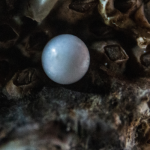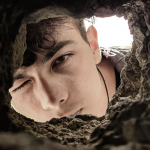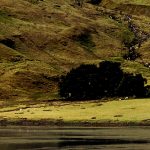Before they viewed the house, the estate agent had barely mentioned the cove. This, in Francine’s mind, had been a mistake. For the house by itself really wasn’t much to shout about. The kitchen was a dingy little hove that had her banging her elbows on the cabinets, plus the master bedroom faced away from the sea. What was the point in that? Having a beach front property and sticking yourself out front, to watch the cracked pavements and the old biddies that hobbled down there. Not to mention the bed, which still sat in that dark room. The only piece of furniture remaining and smelling noticeably of cigarette smoke and decay.
“Shame,” she told John, as they looked out from the garden to the water ahead. “It has such a pretty view.”
Perhaps sensing a sale slipping through her manicured hand, the estate agent had told them to visit the beach.
“It’s really quite something this time of year. You practically have the place to yourself. It’s a real WOW factor – W. O. W.”
“W.O.W – wow,” Francine said when they were out of the saleswoman earshot and down near the water. “Can you believe all this could be ours?”
Rather than a beach, the grass gave way to a steep drop. The only sand in sight at the bottom of jagged rocks. They would be King and Queen of the weeds.
“The hunt continues,” her husband said. Tired. Ever since he had turned 60 he had sounded that way. Not like her. The older Francine got, the louder her voice became, her skin growing tougher and tougher each year.
John was about to head back when she spotted them. Something buried in the tall grass.
“They’re steps,” she cried. Francine peered right over the cliff and saw a staircase, carved into the black rock, invisible to anyone approaching from the house.
“Let’s go down!”
John declined. “It’s a death trap.”
“We’ll be fine.”
“If you want to risk it…”
Whatever happened to the boy she had met at 16 who used to scale apple trees in the dark? Who bit into the shiny flesh and slipped her morsels with his tongue under moonlight. “Only the ones at top taste this sweet, lass.”
She went down alone.
The path was winding, but someone had nailed wooden rails into the rock for support. John’s worried face grew smaller and smaller the further she went until he was nothing more than a black smudge against the grey skies.
“John! You should see this!” She called at the bottom, but he couldn’t hear. Walls hugged in around her, opening up to only the deep blue water. She took off her shoes. A carpet of fine gold sand under her feet. Francine imagined it was how kings felt, locked away in their castles, knowing no one could get inside. Absolute solitude.
“Should we go?” John asked when she returned.
“Let’s give this place another look.”
To the estate agent’s delight, when the couple returned, Francine was singing the place’s praises. What had once been a dump was now filled with potential. Knock down the walls, extend out back, plenty of room for an en-suite.
“You sure?” John asked when she told him to make an offer.
“Of course.”
They moved in the following spring. In the day she would hustle John to call an architect, ran paint colours past him, and made him take bulging bin bags to the skip out front. A busy little bee the biddies called her, though she left most of the neighbourly relations to John to handle. Old women liked John. Starved of male attention, they found his anecdotes about red crested warblers and blue tits endlessly fascinating.
“You’ve got a good man there,” they would say, as he took out the rubbish, ignoring her own paint-splattered clothes and the splinters in her hands. “We wish we had such a go-getting fella.”
At 9 o’clock every night, John told her he was going to bed. Even in summer, when it was still light out, he would keep to this schedule. “I’ll be up in a bit,” she told him.
Under moonlight Francine crawled down the cliff face, steadier than she had ever been in her youth, no longer soft but sinewy with muscle. Now she could gather her own sweet fruit. Which is what she did. Strapped to her back she brought her favourite plates, mugs, figurines, and pictures down to the cove. Hammered them into the walls. Then, piece by piece, she brought the bed. The one left by the dead. She raised it up out of the sand, with waves to cover up the sound of banging.
The mattress she abandoned. No matter how much she beat it, sprayed it, left it out in the open, it smelled like death, like old people. In the end, she burned it. John watched from the window with a cup of tea, as Francine fanned the flames by dancing wildly, wafting magazines.
“You looked like one of those native Americans,” John told her before he then went into a long speech about the migration habits of American robins, which Francine hummed along to.
“Fascinating, dear,” she told him. Her fingers pulled a needle through an old bedsheet.
That night you could have mistaken her for a ghost on the rocks. The white sheet a billowing spectre across her shoulder. Scoop by scoop she filled it with sand until it grew pregnant and heavy. Then she lay it on the bed frame. Her homemade mattress smelled of salt, seaweed, the cool surface of granite.
When John woke up in the morning, for the first time in 50 years, he found the space next to him empty. The birds sang outside his window, and John sat still, trying to guess the colour of their crests. Meanwhile, Francine was staring at the open sky, her bed caught in the rising tide.
…
Biography
Heather Shaw is a writer and cartoonist living in London. When not trying her best to put pen to paper, she produces webcomics over on her Instagram: @SardonicStork. Twitter: @sardonicstork.
Image: unsplash.com





